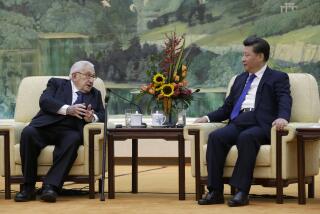Arthur W. Hummel Jr.; Diplomat Helped Change U.S. Policy on China
- Share via
WASHINGTON — Arthur W. Hummel Jr., a career diplomat who fought beside Chinese Nationalist guerrillas during World War II, later helped redefine U.S. policy toward China and returned as U.S. ambassador to the People’s Republic, has died.
Hummel died Tuesday at his Chevy Chase, Md., home. He was 80 and had been battling emphysema.
Hummel, who also served as ambassador to Burma, Ethiopia and Pakistan, was the top U.S. diplomat in Beijing from 1981 to 1985, after diplomatic ties were formally reestablished during the Carter administration.
The son of a prominent scholar on China, Hummel’s resolute mien and broad view of the nation’s history helped him through trouble spots, including potentially destabilizing negotiations over the Reagan administration’s sales of arms to Taiwan.
Hummel was among a group of American diplomats who preached a more pragmatic approach to China. He believed that engagement with the communist nation could hasten change there, a view that sometimes put him at odds with his more hawkish counterparts.
Hummel, who succeeded labor leader Leonard Woodcock, the first ambassador to communist China, was the chief negotiator for a series of joint communiques still regarded by the Chinese as the basis for their relations with the United States. Taciturn during hours of tense talk, Hummel was respected by diplomats on both sides as the embodiment of his Chinese name, which, roughly translated, meant “steady rock.”
Hummel was born in 1920 in central China, where his father was a Congregationalist minister and Sinologist who later headed the Orientalia division of the Library of Congress.
The Hummel family lived in Beijing for eight years before returning to Washington. Hummel went through a rebellious period and was thrown out of prep school twice. He dropped out of Antioch College and hitchhiked across the Midwest working odd jobs.
He returned to China in 1940 to teach English and was in Beijing when it was overrun by the Japanese. He spent two years in an internment camp before escaping to join Nationalist guerrillas on the Shandong plain. There, they battled both Chinese communists and Japanese occupation forces.
After the war, he remained in China as a United Nations relief worker before returning to the United States. He received a master’s degree in Chinese studies from the University of Chicago before joining the State Department in 1950.
One of his first assignments was to find material that would back the testimony of Foreign Service workers under fire during the Army-McCarthy hearings led by Sen. Joseph McCarthy, (R-Wis.). The hearings were a much-criticized attempt by McCarthy to find alleged communist influence in the Army. After that, Hummel was posted to Tokyo, Hong Kong and Rangoon.
In 1965, he became the deputy envoy in Taiwan. His first ambassadorship came in 1968, when he was posted to Burma. He returned in 1971 and was a senior advisor to Secretary of State Henry A. Kissinger. Colleagues remembered Hummel as one of the few subordinates to publicly confront the intimidating secretary.
After a posting in Ethiopia and a return to Washington, Hummel was named ambassador to Pakistan. In 1979, Islamic radicals there shot and killed a Marine guard and set fire to the embassy. Hummel, who was at home during the siege, helped arrange the last-minute rescue of U.S. staffers.
His next appointment was to China. After he retired, Hummel frequently visited the country and served as chairman of the Johns Hopkins University-Nanjing University Center for Chinese and American Studies, based in Washington.
Survivors include his wife of 50 years, Betty Lou Firstenberger Hummel; two sons; a brother; and three grandchildren.
More to Read
Sign up for Essential California
The most important California stories and recommendations in your inbox every morning.
You may occasionally receive promotional content from the Los Angeles Times.













